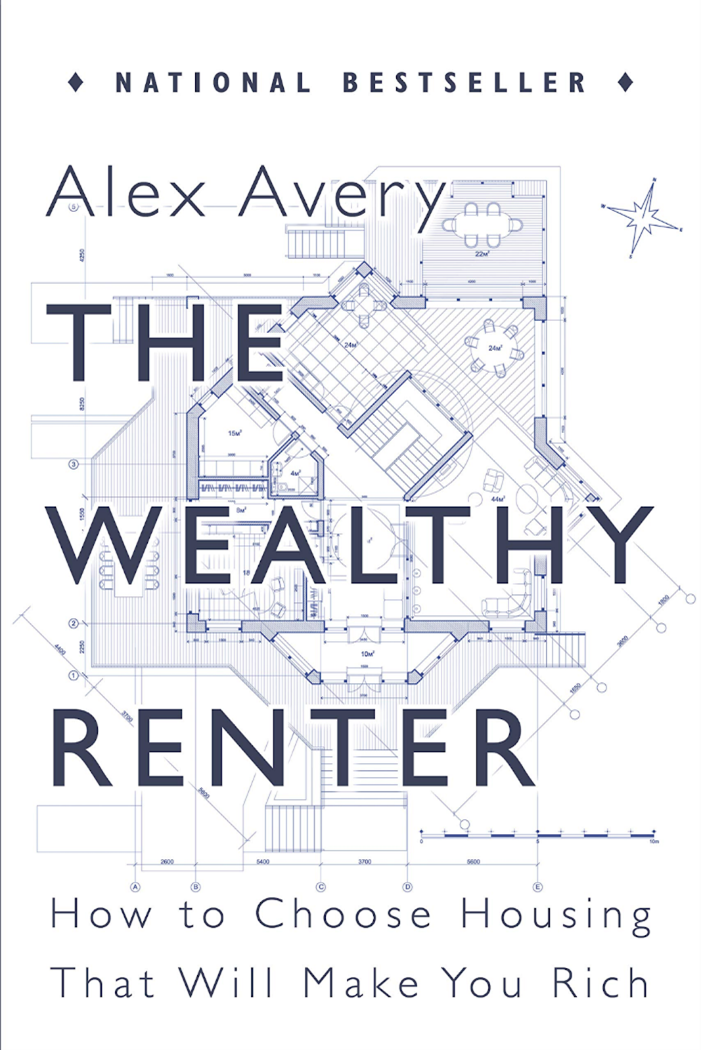A review primarily of Alex Avery’s The Wealthy Renter.
For the sequel, How The Rich Buy a House, click here.
Imagine being pitched on the following investment: you should take the bulk of your life savings, borrow four to nine times more, and use the total to buy a single stock that you’ll hold for decades with an expected real average return of zero. How excited are you to structure your life around participating in this incredible opportunity? Chances are you already are. Most Americans make this choice when they buy a house.
The issue, of course, is that Americans are not coldly purchasing an investment vehicle but emotionally finding a place to raise their family - the telling difference between looking for a house versus a home. And that’s perfectly justifiable, so long as we understand exactly what we are doing: giving up the prospect of better returns to enjoy a certain kind of residence. For the already wealthy, this is a luxury with less cost because there’s so much left over to invest in other things. But most Americans wind up putting more money into their house than any other venture - and that can cap their upside. As Alex Avery, real estate analyst and author of the Wealthy Renter, advises, “The decision to become a homeowner, or the decision to not become a homeowner, is the biggest financial decision you are likely to make in your entire life.”
Figure 1. Unless you are a chronic gambler. Just remember: in a casino, the house always wins. But when it comes to residences, an apartment might be better.
Still, most seem to think that a house is a good investment - let’s interrogate why that may not be the case.
Consider: if single family housing as an asset class is such a fantastic investment, why haven’t the rich and major institutional investors bought as many suburban houses as possible for as long as possible? The typical American has most of his wealth tied up in the house in which he lives and is depending upon the appreciation of the underlying real estate in order to get a return. But an investor has a sweeter incentive: he doesn’t have to live in the house and can therefore get both the appreciation and rent. Despite that extreme advantage, as late as 2018, institutional investors owned less than 1% of the single family housing stock in America. Another 12% or so is owned by smaller investors, including my in-laws, who maintain a couple of rental properties in the neighborhood they grew up in. But the vast majority of houses are owned by the people living in them - and likewise, the vast majority of the wealth of successful investors is not tied up in single family housing. They want better returns, especially for the headaches.
But let’s assume you are living in your place and not collecting rent: how reliable is appreciation alone? According to investment guide William Bernstein, “Real house prices in the United States did not rise at all between 1890 and 1990.” Naturally, in shorter periods, housing has collectively lost value. Everyone remembers 2008. But also: “Between 1989 and 1993, for example, the value for a typical home (when adjusted for inflation) dropped by 7%.” Obviously, a particular region, a particular neighborhood, especially a particular house can see much more dramatic declines. Single family homes have declined in real value in Texas when oil got cheap, in Washington state when the Cold War ended and defense budgets shrank, in small Ohio towns when local factories closed, in big cities when crime rose.
Figure 2. Put another interesting way, the median American house in 2020 cost less in gold than the median house in 1900.
The numbers actually get worse upon closer inspection because the buy and sale prices of houses do not contain all information about the costs borne by the owners - renovations, for example, are not accounted for. To buy or sell a house can cost up to 7.5% of its value in transaction costs to realtors, appraisers, bankers, etc. (compared to 0% to buy and sell into the stock market). And then there’s just plain maintenance, which can cost 1 to 5% of the value of the home every year (compared to 0.04% expense ratio for a good index fund… that also pays you 1%+ in dividends.) There’s a reason why Robert Kiyosaki infamously insisted in Rich Dad, Poor Dad that a house is a liability, not an asset: you keep paying for it rather than it paying you.
To return to the opening hypothetical, a disciplined investor might be terrified to concentrate so much of his money into a single and undiversified, unique and non-fungible, extremely leveraged and illiquid asset with ongoing costs, no income, and a low expected real return. If you were purely investing, an index of stocks is much more attractive. And real estate has its attractions, too: an index of real estate investment trusts (REITs) has a rich dividend and historically competitive returns uncorrelated with the rest of the stock market. For more risk and the prospect of more return, you could invest with professionals through real estate syndications. Or you could take on the challenge of management (and rent collection) yourself, with a keen eye on the bottom line.
But you have to live somewhere, and you can’t live in the stock market. There follows a common, seductive ill logic that insists: if you rent for 30 years, you wind up with nothing. If you pay your mortgage for 30 years, you wind up with a house. Why rent and pay your landlord’s mortgage?
Because you only have three options: you can rent your place, you can rent money for your place, or you can buy your place outright and sacrifice the opportunity to invest significant capital elsewhere. If you are bothered by the fact that rent is money you never get back, remember that interest on your mortgage is money you never get back. As thrift guru Vicki Robin points out, “A house with a thirty year mortgage will cost - depending on the interest rate - two or even three times the purchase price by the time the final payment is made.” Most people rent their houses from a bank and call it a mortgage - you get to paint the walls the color you like but when something breaks, the bank won’t fix it. If you don’t think your mortgage is rent, try not paying it. Khan Academy founder Sal Khan insists: “You’re not a homeowner until you don’t have debt.”
Figure 3. You very probably already live much of your life with a renters’ mindset: do you buy your milk from the store or do you take out a loan to buy a cow and make regular payments to build up equity in milk production?
This email so far has been nearly relentlessly down on owning (and it’s not over yet) in order to shake you out of the general social expectation that it’s always a good idea. To be crystal clear, renting is not always better - you have to run the numbers on local market conditions, general interest rates, and your particular life situation! But beware: most people do not make an apples to apples comparison of their costs - if, for example, the exact same house would cost the exact same in rent or a mortgage payment, from a financial perspective, renting is much cheaper. The reason why is revealed in what MIT grad and prolific YouTuber Sal Khan says “is the single most important video that really anyone can watch.”
Most significantly, when you rent, you can put what would otherwise be your down payment into markets with higher expected real returns. You avoid the substantial transaction costs of buying and selling houses as well as the risk of not being able to sell your home in a down market, forced to maintain two mortgages at once. Renters get a clean predictable comprehensive bill each month. Avery intones: “Figuring out how much of your income you’re spending on housing is so much simpler for renters, and I think that’s one of the reasons renters usually don’t get in over their heads with housing costs.” In contrast, homeowners have costs that average up to 5% of the value of their home a year: predictable but often forgotten costs like property taxes, utilities, insurance, HOA fees, garbage, snow removal, landscaping (“How much was the lawnmower and the gas you put into it?”) And then there’s the unpredictable as described by Avery: “Homeowners often silently, or not so silently, face the substantial and unexpected repair bills associated with owning a home. It could be a cracked foundation, a furnace that died, a leaky roof, or a special assessment from the condo board.” Or as one landlord puts it: “There’s a reason that investment property owners tend to assume that about 45% of the rent will go to expenses” before even paying the mortgage.
Relatedly, do not underestimate the cost of your time. One of the best returns for happiness is the ability to delegate: if you don’t like to fix things yourself and you don’t relish finding and dealing with the right subcontractor, make it instead the headache of your landlord. Or put another way: don’t overestimate your skills, especially if you think it will have a financial payoff. Avery argues that “landlords are more practical and financially disciplined when they spend money on maintaining and renovating rental housing.” I would add that professional real estate investors inherently have a much better feel for what the market will pay for.
Renting clarifies something significant: you are consuming. Bernstein reminds: “Always remember, investment is the deferral of present consumption for future consumption, and if anything qualifies as present consumption, it is a residence,” not an investment. Avery warns that many people buy more than they would rent (another failure of apple to apple comparison), upgrading and expanding their living space because they think of housing as an investment that will pay for itself. As we’ve discussed, that’s not necessarily true - and the bigger you go, the greater your costs. And don’t forget that “more junk equals more junk to move.” Avery insists:
“Because there is clearly no investment being made, renters are forced to see rent for what it is — a consumption item. That makes it easier to see the difference between what they need and what they want. This leads to a much more transparent decision to make about where to live. It’s a simple, straightforward arrangement in which rent is paid for the service of providing housing. There is no confusion about what part of the housing cost is an expense versus an investment.”
Figure 4. “Why rent an apple when I can buy a fruit bowl?”
The last classic advantage of renting is flexibility and even that is underappreciated. Khan observes that there is a correlation between homeownership and unemployment - because people become situated in one place and are not keen to move to opportunity. By freeing yourself of a mortgage, you can more aggressively take on risk, not just investing, but in your career. Flexibility is wide reaching: Can you be so certain that the part of town you choose to live in today will be as attractive in a few years? One of the best predictors of how happy you are where you live is the length of your commute - are you certain that will remain the same? You found a great place to raise a family - but if your grandkids are being raised elsewhere, might you move to them?
You may wonder: why haven’t you heard any of this stuff before? One of William Bernstein’s four pillars of investing is understanding that you do not have aligned incentives with the investing industry, which is out to profit from you. Real estate agents are biased sources of advice because they want you to buy the biggest home possible as frequently as possible - Avery argues that the whole idea of a “starter home” was created by realtors to tap into people’s desire to own without necessarily being a good idea financially. Remember: real estate agents get much of the transaction costs! Listening to a banker on the benefits of home ownership is the exact same as listening to an apartment owner about the benefits of renting. What salesman would you trust to advise you on how much to buy?
Figure 5. Caveat renter: l am a landlord.
Avery also warns against the advice of a particular group of unqualified people: parents.
"Odds are that the best qualification most parents have for providing advice on housing is having bought and owned a house, or possibly more than one… That’s not a very good qualification at all. If it were, anyone who has bought a car is a car expert. Anyone who has bought a stock is a financial wizard. … Most of the time, parents will recommend that you buy a house. Why would they do this? Whether they’ve made good or bad housing decisions, recommending that you buy a house makes them feel better for four good reasons: [1] It affirms their decision to buy a house… [2] Having more buyers helps house prices go higher… [3] It means their kids won’t go through their entire lives without having accumulated a dollar of savings. That’s because buying a home means that eventually their kids will have accumulated some savings once they have paid off a mortgage… [4] A mortgage will make you grow up — and parents like anything that will make their kids more responsible! Anyone who’s ever had a mortgage knows that the day you take a mortgage, you start to look at the world a little differently. You gain respect for property. Your attendance record at work improves, even if it was good to begin with. And you become part of a community."
And maybe those last closing lines make home ownership worthwhile for personal reasons and even society. But they’re not really good reasons for investing. If you run the numbers and determine that home ownership is right for you, our next email will discuss how best to go about it financially.
Figure 6. Click here to acquire Alex Avery’s The Wealthy Renter (8/10). The book has most of the arguments for why renting can be better and a specific analysis of the Canadian marketplace, which has seen an incredible run for housing prices (but also has some version of rent control across most of its states). Note: “About 167 Canadian football fields fit into a square kilometre (CFL fields are 43-percent larger than NFL fields — just saying), which means Canadians have about forty-nine football fields of space each… [But it’s actually quite urbanized:] Overall, some 55 percent of Canadians live in the ten largest cities in Canada. That’s twice the share of Americans in the U.S.’s largest cities.” This anecdote is particularly notable for the renters’ mindset:
“I’ve met a few people who have been particularly enlightened about housing. They generally work in the real estate industry, and these people are renters by choice. The thing that makes them so unique is that, as renters, they have chosen to pay for renovations and improvements to the rented homes they live in. Imagine that. They are paying to renovate the kitchen or the bathrooms (or any part, for that matter) of their landlord’s house. Why would they do that? Well, they tell me a few reasons. First, they like the place they are living in, it’s a hassle to move, and the only thing they aren’t happy with is the kitchen or bathroom or whatever. They also tell me that they like the idea of the discipline that comes with knowing that the renovation they are paying for is in no way a financial investment, but purely a consumption item… Finally, these enlightened renters generally made an agreement with their landlord that the rents won’t change significantly for a few years and that, if they leave the home for any reason in the next few years, the landlord will pay them a portion of the cost of the renovation. In one case, the agreement was that if the tenant left in the first year, the landlord would reimburse them 50 percent of the cost of the renovation, dropping to 35 percent in the second year and 20 percent if they left in years three or four.”
Figure 7. Click here to acquire William Bernstein’s Investor Manifesto (8/10). All of Bernstein’s books are worth reading and this only briefly touches on your residence pointedly because it’s not an investment. In that brief discussion, Bernstein reports: “Amazingly, economists have even assembled a series of house prices along Amsterdam’s tony Herengracht Canal going all the way back to the early seventeenth century. These show absolutely no increase in their after-inflation (real) prices for over almost four centuries—and in one of the world’s best neighborhoods to boot.”
Thanks for reading! If you enjoyed this, forward it to a friend: Know any kids finally leaving their parents' house and about to face living on their own? How about anyone who is interested in personal finance? Or do you happen to know anyone who lives somewhere?
I read over 100 non-fiction books a year (history, business, self-management) and share a review (and terrible cartoons) every couple weeks with my friends. Really, it’s all about how to be a better American and how America can be better. Look forward to having you on board!










